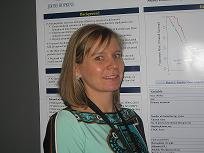Advertisment
ASCO GU Report 2013 – Anticoagulation benefits prostate cancer patients
by Ed Susman – Orlando, Florida – Researchers said they were surprised to find that prostate cancer patients treated with anticoagulants appear to achieve a longer median overall survival than other men with the disease who have not been diagnosed with life-threatening blood clots.
Picture: Caroline Pratz, Johns Hopkins University, at her poster presentation
“This result is paradoxical given that all patients who received anticoagulation did so because of the presence of venous thromboembolic disease, which itself might be expected to confer shorter survival,” said lead author of the study, Caroline Pratz, MSN, a nurse practitioner at the Sidney Kimmel Comprehensive Cancer Center at Johns Hopkins University, Baltimore, Maryland, at her poster presentation during the 9th Genitourinary Cancers Symposium.
Overall, men who were treated with anticoagulants achieved a 39% relative reduced risk of mortality, although most of the benefit accrued to the patients who were treated with low molecular weight heparin as opposed to warfarin to combat venous thromboembolism.
Of the 29 men in the study treated with anticoagulation, 15 had venous thromboembolisms; 9 had pulmonary embolisms and 5 patients had experienced both venous thromboembolisms and pulmonary embolisms. That group was compared with outcomes of 218 other men with prostate disease treated at Johns Hopkins from 1998 to 2010.
Nevertheless, Pratz, in her retrospective study, reviewed medical records limited to men who were undergoing treatment regimens that contained docetaxel. The men in the study had been diagnosed with metastatic castrate-resistant prostate cancer.
The reason why patients who should be at greater risk of mortality should do better than the general population was elusive, she said. “There have been some studies that suggest heparin has some anti-cancer effects. As a retrospective study, we just know that some men got anticoagulation and others did not,” she explained/
In the study, 29 of the 247 men included in the research report underwent treatment with anticoagulation – 17 of the men were treated with low molecular weight heparin and 12 received warfarin. The use of warfarin was associated with an 18% reduction in the risk of death, but that failed to reach statistical significance (p=.23). The use of low molecular weight heparin was associated with a 42% reduction in the relative risk of death – a significant finding (p=.048). Overall survival was calculated from the date for first docetaxel chemotherapy treatment until death,
Median overall survival was 20.9 months among the men receiving any anticoagulant and 17.1 months for patients not receiving anticoagulant, Pratz reported.
The men in the study were about 67.5 years of age and three-fourths were white. Twenty percent of the men had undergone prostate surgery; 34% had been treated with radiation; 19% received both surgery and radiation; 20% of the patients had received no prior primary treatment; 76% of the men were in ECOG performance class 0-1. About 75% of the patients had more than 10 metastatic lesions.
“We think the therapeutic potential of anticoagulation, especially with low molecular weight heparin in metastatic castration-resistant prostate cancer should be prospectively studied,” Pratz said.
The symposium, attended by more than 2,400 doctors, researchers and allied health care professionals, is co-sponsored by the American Society of Clinical Oncology, the American Society for Radiation Oncology and the Society of Urologic Oncology.
____
Presentation title: Abstract 28: The effect of therapeutic anticoagulation on overall survival in men receiving docetaxel chemotherapy for metastatic castration-resistant prostate cancer.
28 General Poster Session A (Board #C1), Thu, 11:45 AM-1:15 PM and 5:05 PM-6:35 PM.
The effect of therapeutic anticoagulation on overall survival (OS) in men receiving docetaxel chemotherapy for metastatic castration-resistant prostate cancer (mCRPC).
Caroline F. Pratz, Robert A. Brodsky, Emmanuel S. Antonarakis; Johns Hopkins Sidney Kimmel Comprehensive Cancer Center, Baltimore, MD; Johns Hopkins Medicine, Baltimore, MD; Sidney Kimmel Comprehensive Cancer Center at Johns Hopkins University, Baltimore, MD
Background: Anticoagulants have been postulated to possess antitumor activity, although clinical data supporting this claim are conflicting. We sought to examine the effect of therapeutic anticoagulation on OS in men with mCRPC receiving first-line docetaxel chemotherapy.
Methods: We retrospectively reviewed the records of 247 consecutive mCRPC patients who received first-line docetaxel chemotherapy between 1/1/1998 and 1/1/2010. Information on anticoagulant use, type of anticoagulant administered, indication for anticoagulation, and duration of anticoagulation were captured. Univariate and multivariable Cox proportional hazards regression models were developed to investigate the effect of anticoagulant use on OS.
Results: In all, 29/247 men (11.7%) received anticoagulation (LMW heparin: 17/247; warfarin: 12/247). The indication was DVT in 15/247, PE in 9/247, and both DVT and PE in 5/247 men. In univariate analysis, anticoagulant use was associated with improved OS (any anticoagulant, HR 0.61 [95%CI 0.40–0.94] P50.024; LMW heparin, HR 0.58 [95%CI 0.34–0.99] P50.048; warfarin, HR 0.82 [95%CI 0.55–1.28] P50.23). Median OS was 20.9 mo (with any anticoagulant) versus 17.1 mo (with no anticoagulant). In multivariable analysis, anticoagulant use remained a significant predictor of OS after adjusting for other prognostic factors (Table).
Conclusions: Anticoagulant use is an independent predictor of OS in men with mCRPC receiving docetaxel. This finding is surprising given that the occurrence of venous thrombosis might be expected to negatively influence OS. If validated, these data may provide the impetus to explore the antitumor potential of anticoagulants in prospective clinical trials.
Variable Hazard ratio for death (95% CI) P value
Anticoagulation
Yes vs No 0.63 (0.41, 0.98) 0.038
Alkaline phosphatase
<98 vs >99 U/L 0.58 (0.43, 0.79) ,0.001
Albumin
>3.9 vs <3.8 U/L 0.65 (0.48, 0.87) 0.005
Hemoglobin
>12 vs <12 g/dL 0.65 (0.49, 0.87) 0.004
PSA (log)
<4.7 vs >4.8 0.63 (0.47, 0.85) 0.002
No. of chemo cycles
>6 vs <5 0.60 (0.45, 0.80) ,0.001
ECOG status
0 vs >1 0.70 (0.52, 0.93) 0.016






